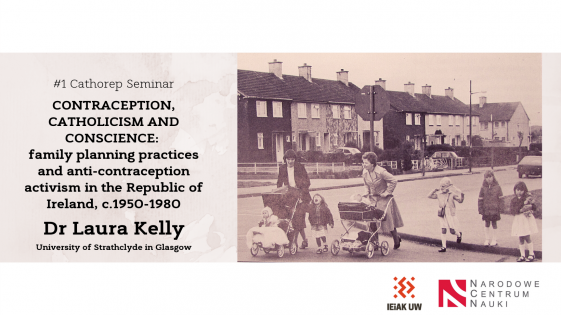Contraception, Catholicism and Conscience: family planning practices and anti-contraception activism in the Republic of Ireland, c.1950-1980

Zapraszamy na pierwsze seminarium z serii "Catholicising Reproduction, Reproducing Catholicism" (Cathorep), projektu realizowanego dzięki dotacji NCN przez prof. UW Agnieszkę Kościańską z IEiAK (projekt):
Contraception, Catholicism and Conscience: family planning practices and anti-contraception activism in the Republic of Ireland, c.1950-1980
Dr Laura Kelly (University of Strathclyde in Glasgow)
Contraception was illegal in the Republic of Ireland from 1935 to 1979 and artificial contraceptives were difficult to access before legalisation. The contraceptive pill was available as a ‘cycle regulator’ from 1963, but access depended on a sympathetic doctor. With the establishment of family planning clinics in urban centres such as Dublin, Galway, Limerick and Cork from the 1970s, it became possible for some middle-class, urban-based men and women to access contraception. However, the majority of men and women struggled to access contraceptives. While recent valuable studies have illuminated the role of the Catholic Church hierarchy, Irish government and the medical profession in debates surrounding contraception in Ireland in the twentieth century, the experiences of ‘ordinary’ men and women have been severely neglected.
This lecture seeks to address this significant gap. The first part of it will draw primarily on new oral history interviews with over 100 Irish men and women born before 1955, exploring the birth control practices in Ireland prior to the legalisation of contraception in 1979. In particular, the paper will highlight the impact of Church teachings on individuals’ knowledge and understanding of sex and reproduction as well as decision-making processes in relation to family planning. Ultimately, the paper will emphasise individuals’ agency and resilience in the face of legal and religious restrictions and suggest that couples planning their families in the wake of Humanae Vitae were beginning to follow their own consciences in relation to birth control. The second part of the lecture will briefly explore the role of anti-contraception campaigners and activists in debates around the legalisation of contraception in Ireland, illustrating these groups’ concern that the legalisation of contraception would lead to the introduction of abortion.
Bio:
Dr Laura Kelly is senior lecturer at the University of Strathclyde in Glasgow. She has published two monographs on the history of women in medicine and on medical education and student culture in Ireland respectively. Her current research project ‘Contraception and Modern Ireland, c.1922-92’ is funded by a Wellcome Trust research fellowship and forms the basis of a forthcoming monograph with Cambridge University Press.
Cathorep Seminars are monthly meetings, during which researchers from around the world will introduce participants to the results of their work concerning catholic activism related to reproductive rights and gender. We believe that an international perspective can enrich the discussion ongoing in Poland, and give a more complex picture of the relationships between the Catholic Church and reproductive practices.
The meetings are organised as part of the project „Catholicising Reproduction, Reproducing Catholicism: Activist Practices and Intimate Negotiations in Poland, 1930 - Present”, conducted at the Institute of Ethnology and Cultural Anthropology, University of Warsaw, funded with an OPUS NCN scheme.


